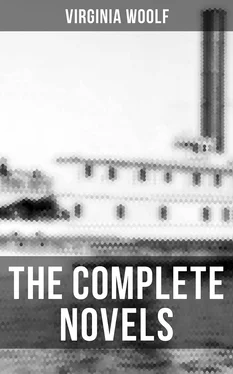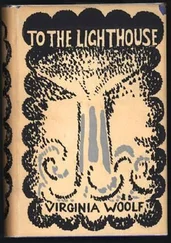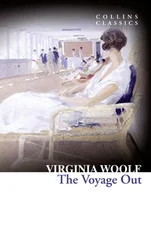“We’re off,” said Ridley.
A slight but perceptible wave seemed to roll beneath the floor; then it sank; then another came, more perceptible. Lights slid right across the uncurtained window. The ship gave a loud melancholy moan.
“We’re off!” said Mr. Pepper. Other ships, as sad as she, answered her outside on the river. The chuckling and hissing of water could be plainly heard, and the ship heaved so that the steward bringing plates had to balance himself as he drew the curtain. There was a pause.
“Jenkinson of Cats—d’you still keep up with him?” asked Ambrose.
“As much as one ever does,” said Mr. Pepper. “We meet annually. This year he has had the misfortune to lose his wife, which made it painful, of course.”
“Very painful,” Ridley agreed.
“There’s an unmarried daughter who keeps house for him, I believe, but it’s never the same, not at his age.”
Both gentlemen nodded sagely as they carved their apples.
“There was a book, wasn’t there?” Ridley enquired.
“There was a book, but there never will be a book,” said Mr. Pepper with such fierceness that both ladies looked up at him.
“There never will be a book, because some one else has written it for him,” said Mr. Pepper with considerable acidity. “That’s what comes of putting things off, and collecting fossils, and sticking Norman arches on one’s pigsties.”
“I confess I sympathise,” said Ridley with a melancholy sigh. “I have a weakness for people who can’t begin.”
“… The accumulations of a lifetime wasted,” continued Mr. pepper. “He had accumulations enough to fill a barn.”
“It’s a vice that some of us escape,” said Ridley. “Our friend Miles has another work out to-day.”
Mr. Pepper gave an acid little laugh. “According to my calculations,” he said, “he has produced two volumes and a half annually, which, allowing for time spent in the cradle and so forth, shows a commendable industry.”
“Yes, the old Master’s saying of him has been pretty well realised,” said Ridley.
“A way they had,” said Mr. Pepper. “You know the Bruce collection?—not for publication, of course.”
“I should suppose not,” said Ridley significantly. “For a Divine he was—remarkably free.”
“The Pump in Neville’s Row, for example?” enquired Mr. Pepper.
“Precisely,” said Ambrose.
Each of the ladies, being after the fashion of their sex, highly trained in promoting men’s talk without listening to it, could think—about the education of children, about the use of fog sirens in an opera—without betraying herself. Only it struck Helen that Rachel was perhaps too still for a hostess, and that she might have done something with her hands.
“Perhaps—?” she said at length, upon which they rose and left, vaguely to the surprise of the gentlemen, who had either thought them attentive or had forgotten their presence.
“Ah, one could tell strange stories of the old days,” they heard Ridley say, as he sank into his chair again. Glancing back, at the doorway, they saw Mr. Pepper as though he had suddenly loosened his clothes, and had become a vivacious and malicious old ape.
Winding veils round their heads, the women walked on deck. They were now moving steadily down the river, passing the dark shapes of ships at anchor, and London was a swarm of lights with a pale yellow canopy drooping above it. There were the lights of the great theatres, the lights of the long streets, lights that indicated huge squares of domestic comfort, lights that hung high in air. No darkness would ever settle upon those lamps, as no darkness had settled upon them for hundreds of years. It seemed dreadful that the town should blaze for ever in the same spot; dreadful at least to people going away to adventure upon the sea, and beholding it as a circumscribed mound, eternally burnt, eternally scarred. From the deck of the ship the great city appeared a crouched and cowardly figure, a sedentary miser.
Leaning over the rail, side by side, Helen said, “Won’t you be cold?” Rachel replied, “No…. How beautiful!” she added a moment later. Very little was visible—a few masts, a shadow of land here, a line of brilliant windows there. They tried to make head against the wind.
“It blows—it blows!” gasped Rachel, the words rammed down her throat. Struggling by her side, Helen was suddenly overcome by the spirit of movement, and pushed along with her skirts wrapping themselves round her knees, and both arms to her hair. But slowly the intoxication of movement died down, and the wind became rough and chilly. They looked through a chink in the blind and saw that long cigars were being smoked in the dining-room; they saw Mr. Ambrose throw himself violently against the back of his chair, while Mr. Pepper crinkled his cheeks as though they had been cut in wood. The ghost of a roar of laughter came out to them, and was drowned at once in the wind. In the dry yellow-lighted room Mr. Pepper and Mr. Ambrose were oblivious of all tumult; they were in Cambridge, and it was probably about the year 1875.
“They’re old friends,” said Helen, smiling at the sight. “Now, is there a room for us to sit in?”
Rachel opened a door.
“It’s more like a landing than a room,” she said. Indeed it had nothing of the shut stationary character of a room on shore. A table was rooted in the middle, and seats were stuck to the sides. Happily the tropical suns had bleached the tapestries to a faded blue-green colour, and the mirror with its frame of shells, the work of the steward’s love, when the time hung heavy in the southern seas, was quaint rather than ugly. Twisted shells with red lips like unicorn’s horns ornamented the mantelpiece, which was draped by a pall of purple plush from which depended a certain number of balls. Two windows opened on to the deck, and the light beating through them when the ship was roasted on the Amazons had turned the prints on the opposite wall to a faint yellow colour, so that “The Coliseum” was scarcely to be distinguished from Queen Alexandra playing with her Spaniels. A pair of wicker arm-chairs by the fireside invited one to warm one’s hands at a grate full of gilt shavings; a great lamp swung above the table—the kind of lamp which makes the light of civilisation across dark fields to one walking in the country.
“It’s odd that every one should be an old friend of Mr. Pepper’s,” Rachel started nervously, for the situation was difficult, the room cold, and Helen curiously silent.
“I suppose you take him for granted?” said her aunt.
“He’s like this,” said Rachel, lighting on a fossilised fish in a basin, and displaying it.
“I expect you’re too severe,” Helen remarked.
Rachel immediately tried to qualify what she had said against her belief.
“I don’t really know him,” she said, and took refuge in facts, believing that elderly people really like them better than feelings. She produced what she knew of William Pepper. She told Helen that he always called on Sundays when they were at home; he knew about a great many things—about mathematics, history, Greek, zoology, economics, and the Icelandic Sagas. He had turned Persian poetry into English prose, and English prose into Greek iambics; he was an authority upon coins; and—one other thing—oh yes, she thought it was vehicular traffic.
He was here either to get things out of the sea, or to write upon the probable course of Odysseus, for Greek after all was his hobby.
“I’ve got all his pamphlets,” she said. “Little pamphlets. Little yellow books.” It did not appear that she had read them.
“Has he ever been in love?” asked Helen, who had chosen a seat.
This was unexpectedly to the point.
Читать дальше












